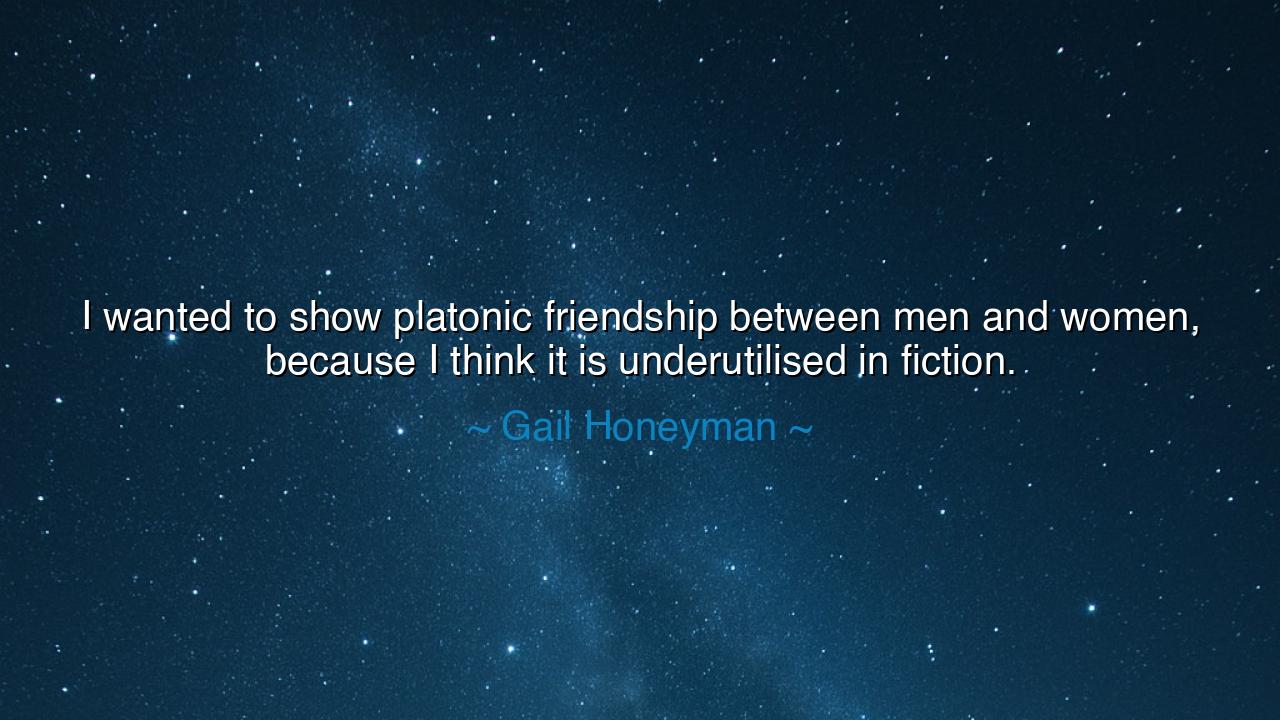
I wanted to show platonic friendship between men and women
I wanted to show platonic friendship between men and women, because I think it is underutilised in fiction.






In the vast expanse of human relationships, there exists a bond of pure friendship that has often been overshadowed by the complexities of romantic entanglements. Gail Honeyman, in her wisdom, seeks to bring light to this underexplored relationship when she says, "I wanted to show platonic friendship between men and women, because I think it is underutilised in fiction." These words resonate with a truth that the ancients knew well: that friendship—true, unclouded by romantic desire—holds a value all its own. It is a bond that transcends the fleeting nature of attraction and reaches into the deep reservoirs of trust, respect, and shared understanding.
Platonic friendship, a term that carries the weight of centuries of philosophical thought, has been a cornerstone of human connection since the days of Plato himself. The philosopher wrote extensively on the nature of love and friendship, distinguishing between the fleeting passions of the body and the eternal, soul-deep bonds that come from mutual respect and intellectual connection. In Plato’s "Symposium", we see characters engaged in deep philosophical discussion about love, where the highest form of affection is not that which leads to physical desire, but that which elevates the soul. This platonic form of love is one that, like a tree that grows in the sunlight without expectation of fruit, sustains without demanding anything in return.
Honeyman’s call to highlight this platonic bond between men and women is a timely one. In a world where romantic relationships often take center stage in stories, she seeks to show that there is beauty and power in the friendship that exists without the weight of expectation. This is not to diminish the importance of romantic love, but to illuminate a truth that has always existed: that two people, regardless of gender, can share a deep and meaningful connection without the need for romance to define it. This pure friendship is rooted in shared experiences, mutual respect, and a profound understanding of one another’s humanity.
The ancients often celebrated this kind of friendship. Take, for example, the bond between David and Jonathan, two figures from the Bible whose friendship is said to have been stronger than love. Their relationship, devoid of romantic or physical elements, was instead built on shared values, loyalty, and sacrifice. Jonathan, despite his own status as heir to the throne, remained steadfast in his loyalty to David, understanding that true friendship transcends the potential for personal gain. Their bond became a symbol of the platonic ideal—a relationship based not on desire, but on the purity of shared connection and mutual support.
Honeyman, in her exploration of this concept, is not simply making a literary point; she is shining a light on a truth that has been misunderstood or overlooked in much of human history. For too long, society has placed the romantic relationship as the pinnacle of human connection, when in truth, platonic friendships—those without romantic expectations—have the potential to be equally, if not more, fulfilling. This is not to say that romantic relationships do not hold immense value, but rather that the underutilization of platonic bonds in storytelling reveals a gap in the way we view human connection.
The lesson here is clear: true friendship—whether between men and women, or among individuals of the same gender—is an essential part of our shared human experience. Platonic friendships offer a foundation upon which we can build trust, respect, and growth without the complexities of romantic attachment. In these relationships, we find space for authenticity—a freedom to be ourselves without the pressure of expectations or societal norms. They are relationships that allow for emotional depth, support, and a shared journey that is grounded in the purity of connection.
In our own lives, we must recognize the beauty and importance of these platonic friendships. Too often, we overlook the value of these relationships, seeking romantic connections or viewing friendships as something that must eventually evolve into something more. But as Honeyman suggests, there is great power in simply being there for one another, without the burden of expectations. We must nurture and celebrate the friendships we have with others, recognizing that these bonds are not only fulfilling but necessary for our emotional well-being. In doing so, we not only honor those friendships but also build stronger communities and more resilient selves.
Let us, then, strive to embrace the platonic friendships in our own lives. Let us build relationships that are not driven by desire but by mutual respect, understanding, and authentic connection. In a world that often values the fleeting and the transient, let us remember the power of those relationships that stand the test of time, grounded in the pure connection between human beings. In this, we find not just companionship, but the true meaning of what it is to be human.






AAdministratorAdministrator
Welcome, honored guests. Please leave a comment, we will respond soon